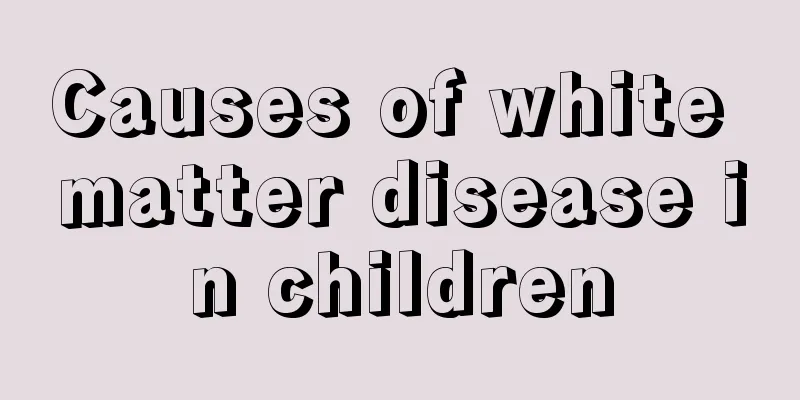What causes black spots on children's teeth?

|
In recent years, the phenomenon of black spots on children's teeth has become more and more serious, and most of them are children aged three or four. Experts say that the causes of this symptom include caries, pigmentation, etc., and the occurrence of this phenomenon is caused by the baby's lack of attention to oral hygiene. Therefore, in order to stay away from this phenomenon, you must develop good oral hygiene and actively develop the good habit of brushing your teeth in the morning and evening and rinsing your mouth after meals. 1. What causes black spots on children’s teeth? One is tooth decay. This kind of "black" cannot be brushed away by brushing, and it will form "holes" that need treatment, especially for four-year-old children, because the deciduous teeth of children of this age are relatively early to be replaced. The second is pigment, which can be partially removed by brushing. For children, pigment is related to dietary characteristics and oral hygiene. Pigment on the tooth surface will not form "holes", but will make the tooth surface rough, which is conducive to the formation and adhesion of plaque and prone to caries. It can be treated by polishing as appropriate. If the child is not very cooperative with the treatment, you can observe while maintaining oral hygiene. 2. 3 Tips to Prevent Tooth Caries 1. Adjust your diet Starting from the fetal period, expectant mothers should pay attention to calcium supplementation, which will provide a good development foundation for the baby's teeth. You should also eat more vegetables and fruits, and drink green tea, milk and other foods and beverages containing a certain amount of fluoride, which will have obvious benefits for your baby's future tooth development and reduce the chance of tooth decay. During the period of tooth development, ensure adequate supply of protein, vitamins A, B, C, D and foods containing minerals such as calcium, iron, phosphorus, etc. to facilitate the normal development of teeth. Eat more fiber-rich vegetables and crunchy fruits. Vegetable dietary fiber is an anti-caries nutrient widely found in vegetable foods. It cleans the tooth surface through mechanical friction and stimulates salivary gland secretion, thereby reducing food adhesion and dental plaque formation. Eat less sweets and snacks to reduce the chance of bacteria producing acid. 2. Clean your teeth When the baby's deciduous teeth begin to erupt at around 6 months old, the mother can put gauze on her index finger and clean the baby's teeth after breastfeeding and eating. From the age of 3, babies should be taught to develop the habit of brushing their teeth in the morning and evening and rinsing their mouths after meals. It is best to drink a small glass of water after each meal, and then rinse your mouth with clean water or light salt water. Brushing your teeth and rinsing your mouth can remove food debris and plaque on your teeth, and also massage the gums, enhancing the tissue's resistance to disease. The brushing posture should be correct. The correct posture is to brush the upper teeth from top to bottom and the lower teeth from bottom to top. When brushing the upper and lower jaw surfaces, place the toothbrush on the jaw surface and brush back and forth horizontally with a little force, trying to brush all the way up, down, inside and outside. The number of times or time of brushing teeth should be based on the "three-three system", that is, brush your teeth within 3 minutes after each meal, and brush your teeth 3 times a day, and the brushing time each time should not be less than 3 minutes. The correct choice of toothbrush: choose a children's health toothbrush with a shorter and narrower brush head, which can move freely in the mouth and has softer bristles. Choose a medicated toothpaste containing fluoride. The oxide has an antibacterial effect and also inhibits bacterial adhesion. It also has a remineralization effect on tooth tissue and plays an anti-caries role. 3. Regular inspection and fissure sealing Go to the hospital for regular check-ups, preferably once every six months. Before your baby's teeth change, if you find cavities, you should go to the hospital for examination and treatment in time, otherwise it will affect the health of the permanent teeth. Pit and fissure sealing: This method of preventing tooth decay has been used since the 1960s. It has certain benefits and has been popularized to every baby in some cities. |
<<: What causes black spots in children's eyes?
>>: What to do if your child has a viral cough
Recommend
How to do waist bending exercise for children
Bending down requires a lot of flexibility from t...
How many months is it best to supplement iron for babies?
After the baby is born, the nutrients in his body...
What should children eat to grow taller quickly?
In daily life, we often hear many parents complai...
How to treat bedwetting in children? These methods solve the problem
Bedwetting in children must be a problem that tro...
6-year-old girl's underwear has yellow discharge
As we all know, after women enter puberty, their ...
What to do if your child sucks his lips
Many babies bite their lips, and some even bite t...
Two years and two months baby development standard
Although today's young parents don't know...
What complementary food should a five-month-old baby eat?
What to feed a five-month-old baby is really a he...
What to do if baby's skin is chapped
The physical health of the baby is one of the thi...
Can a child with 200-degree myopia not wear glasses?
As parents, we should certainly pay attention to ...
Can vitiligo in children be cured?
In this era, every parent pays great attention to...
How to cure rhinitis in children?
Children have weaker constitutions and are more e...
What to do if your child doesn't eat well
Every parent hopes that their children can eat we...
How to supplement children's vitamin deficiency
Vitamins are essential nutrients for the human bo...
Which medicine is effective for children with anemia?
The child's face is pale and bloodless, which...









